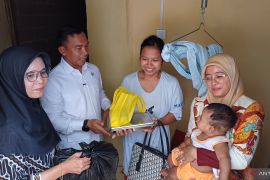"After experiencing the process of pregnancy, their health level will certainly be a determinant for the next survival," director of population planning and control at BKKBN, Munawar Asikin, said at a webinar on “Nutritional and Food Management Makes Healthy Pregnant Women, a Stunting Free, Healthy and Smart Generation,” accessed from here on Wednesday.
According to him, quite a lot of children are born stunted because pregnant women continue to diet. In reality, pregnant women need high nutritional intake during pregnancy to ensure their children are free from chronic energy deficiency.
"We are also working with the Ministry of Health to monitor child development and child growth, one of which is that we are identifying the risk of stunting in newborn children," he said.
Several studies have shown that if newborns measure less than 48 centimeters in length and weigh less than 2.5 kilograms, they can be categorized as stunted, Asikin noted.
"The child needs immediate handling to be free from stunting," he added.
He then pointed out that Indonesia's stunting rate is still relatively high.
Based on the results of the Indonesia Nutrition Status Survey (SSGI) conducted by the Ministry of Health in 2021, the stunting prevalence rate in Indonesia stood at 24.4 percent, a decline of 6.4 percent from 30.8 percent in 2018.
Earlier, an obstetrician-gynecologist from the Faculty of Medicine at the University of Indonesia (FKUI), Prof. Dr. Dwiana Ocviyanti, SpOG(K), MPH, explained that there are several health problems that pregnant women need to watch out for because they can cause stunting or failure to thrive in children.
"One is anemia. Two, if the mother is pregnant in her teens. Three, high blood pressure, either early in pregnancy or throughout pregnancy. Four, if the mother is obese. Five, chronic energy deficiency, weighs less than 45 kilograms in early pregnancy, especially if the mother suffers from chronic diseases, such as tuberculosis, malaria, and HIV," she expounded.
Related news: BKKBN class to build parents' understanding of early infant life
Related news: Forty percent of Indonesian population projected to be unproductive
Translator: Zubi Mahrofi, Raka Adji
Editor: Rahmad Nasution
Copyright © ANTARA 2022












